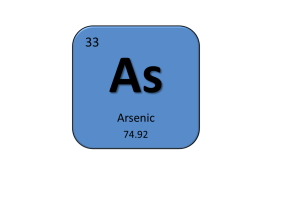Arsenic

Arsenic is found in soil and water in some areas, and in some foods. It occurs naturally and from human activity. Arsenic compounds were used extensively as pesticides and wood preservatives, but these uses have been mostly phased out. There are different forms of arsenic, some of which may cause health problems and others that are not a health concern.
Download
Arsenic is found in:
- Some foods, including:
- Seafood, especially shellfish. The form of arsenic in seafood is not considered to be a health concern.
- Rice and foods with rice-based ingredients, such as some hot and cold cereals, some infant formulas, and rice cakes. Rice plants can take up arsenic from water or soil.
- Hijiki seaweed (short, black, noodle-like seaweed).
- Drinking water sources in some places, such as parts of the Central Valley and some areas in Southern California.
- Some pressure-treated wood used in outdoor structures, such as decks and playground equipment. Arsenic-treated wood was phased out in 2004.
- Cigarette and other tobacco smoke.
- Some herbal medicines and other traditional remedies, especially from China and India.
- Some herbicides in limited use at golf courses, cotton farms, and sod-growing facilities.
Possible health concerns of some forms of arsenic:
- May harm the developing fetus.
- May harm the nervous system and affect learning in children.
- May contribute to cardiovascular disease and affect lung function.
- Can increase cancer risk.
Possible ways to reduce exposure to forms of arsenic that may affect health:
- Include plenty of variety in your and your child’s diet.
- If you have an infant, breastfeed if you can. Include alternatives to rice-based foods in your infant’s diet.
- Do not burn older pressure-treated wood (manufactured before 2004), and avoid using it for home projects.
- Have children wash their hands after they play on or around older wooden play structures or decks. If you own such a structure or deck, apply a sealant or coating every one to two years.
- Because arsenic can collect in dust:
- Wash your and your child’s hands often, especially before preparing or eating food.
- Clean your floors regularly, using a wet mop or HEPA vacuum if possible, and use a damp cloth to dust.
- If your water comes from a private well, have it tested for metals, including arsenic. (If your water comes from a public water supplier, it is already tested regularly for arsenic.)
For More Information
Arsenic in rice and rice products
https://www.fda.gov/Food/FoodborneIllnessContaminants/Metals/ucm319948.htm


